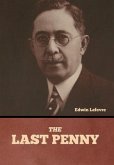"The Last Penny" by Edwin Lefevre plunges into the heart of the early 20th century automobile industry, a period of rapid innovation and burgeoning fortunes. This work of financial fiction explores the complex world of business ethics during the industrial age, where the pursuit of wealth often overshadows moral considerations. Lefevre's narrative offers a glimpse into the potentially corrosive effects of greed, examining the human cost of unchecked ambition within a rapidly evolving industry. A timeless story of ambition and its consequences, "The Last Penny" provides a captivating look at a pivotal era in American business history. It remains relevant for anyone interested in the ethical dilemmas at the intersection of finance and industry. This work has been selected by scholars as being culturally important, and is part of the knowledge base of civilization as we know it. This work is in the public domain in the United States of America, and possibly other nations. Within the United States, you may freely copy and distribute this work, as no entity (individual or corporate) has a copyright on the body of the work. Scholars believe, and we concur, that this work is important enough to be preserved, reproduced, and made generally available to the public. We appreciate your support of the preservation process, and thank you for being an important part of keeping this knowledge alive and relevant.
Bitte wählen Sie Ihr Anliegen aus.
Rechnungen
Retourenschein anfordern
Bestellstatus
Storno









